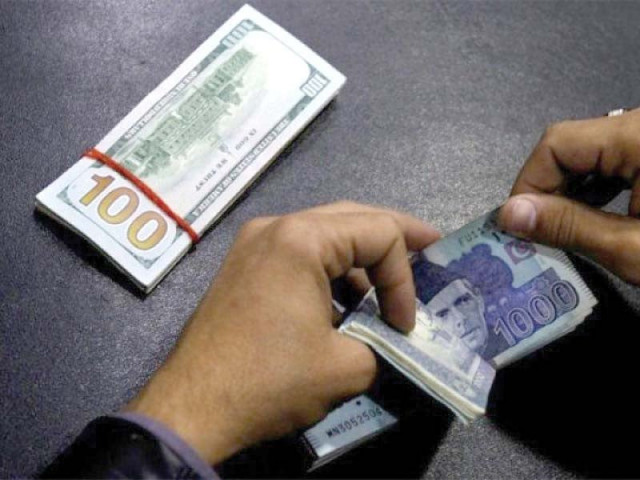Rupee dives as rumours spark fears
Talk of freezing foreign currency accounts creates uncertainty in market

Pakistani currency dived 1.07% (or Rs2.14) to a two-week low at Rs200.06 against the US dollar in the inter-bank market on Monday due partly to strong rumours that the government was considering freezing foreign currency accounts.
The rupee closed at Rs197.92 on Friday, according to the central bank.
“Rumours of freezing foreign currency accounts created uncertainty in the foreign exchange market … taking rupee above Rs200 (against the greenback),” finance ministry’s former adviser Dr Khaqan Hasan Najeeb said while talking to The Express Tribune.
The rupee hit an intra-day low at Rs200.51 before partly recovering.
Monday was the second consecutive working day when the rupee maintained its downturn. Cumulatively, in the past two days, the currency has lost 1.25% (or Rs2.47) of its value.
There were strong rumours about the imposition of financial emergency in the country, meaning the authorities concerned were considering ceasing financial transactions through the foreign currency accounts managed by households and businesses, but the rumours proved to be untrue.
Finance Minister Miftah Ismail, the Ministry of Finance and State Bank of Pakistan (SBP) came up with clarifications, dismissing the rumours later in the day.
The finance minister said on his official Twitter handle “there is absolutely no plan to freeze foreign currency accounts or Roshan Digital Accounts (RDA) or take over people’s private lockers. We have never even contemplated these steps. Nor will we ever do it. Speculation on social media about this is wrong and coming from biased quarters.”
Experts said that the drop in the rupee’s value came partly as a result of oil import payments by local traders.
Moreover, the currency dived following a sharp rise in crude oil prices that hovered around $120 per barrel in the global market. Pakistan heavily relies on oil import.
The single-day fall in the rupee’s value has been termed significant. “This is a cause of concern,” Taurus Securities’ Head of Research Mustafa Mustansir said while talking to The Express Tribune.
The analyst said that budget uncertainties had mounted renewed pressure on the rupee.
“IMF will consider resuming its loan programme after seeing whether Pakistan has fulfilled the prerequisite commitments in the budget,” Mustansir said.
The government was expected to make financial adjustments worth Rs2 trillion in the budget for FY23 by cutting annual expenditures and increasing tax revenues, he said.
Experts said that the resumption of IMF programme was a must to stabilise the foreign exchange reserves and the rupee as well as stop the worsening of the balance of payments crisis.
The reserves have depleted by over $7 billion in the past six months to a critically low level at $9.72 billion that provides just six weeks of import cover.
Najeeb added that for certainty to prevail on a permanent basis in the foreign exchange market, Pakistan must resume the IMF loan programme.
The government and the State Bank said in a joint statement that they were taking all necessary measures to ensure macroeconomic stability in the country.
“The recent difficult decisions taken by the government, including the reduction of subsidy on petroleum products, will pave the way for an agreement with the IMF and release of the IMF tranche (worth around $1 billion) and financial assistance from other multilateral agencies and friendly countries.”
Earlier, Moody’s Investors Service downgraded Pakistan’s credit rating outlook to “negative from stable” on fears the global commodity prices would remain elevated, which would continue to keep the current account deficit widened and impact the foreign exchange reserves in the current fiscal year as well as next year.
Moody’s statement also prompted traders to buy US dollars at any available price.
Published in The Express Tribune, June 7th, 2022.
Like Business on Facebook, follow @TribuneBiz on Twitter to stay informed and join in the conversation.


















COMMENTS
Comments are moderated and generally will be posted if they are on-topic and not abusive.
For more information, please see our Comments FAQ